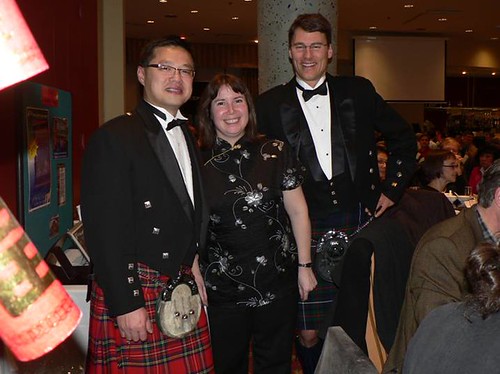
Gung Haggis Fat Choy goes Montreal
via Maisoneuve Magazine/website
Check out this interview I did for Maisoneuve Magazine with writer Christopher DeWolf
PIPING IN THE (CHINESE) NEW YEAR
HOW VANCOUVER’S CHINESE NEW YEAR CELEBRATION IS PROMOTING INTERCULTURALISM IN CANADA’S WESTERN METROPOLIS
http://www.maisonneuve.org/index.php?&page_id=12&article_id=2030
Christopher DeWolf writes about the different ways Chinese New Year is
being celebrated in Vancouver – but I will just get to the good stuff
here. Click on the links to visit the full article at Maisoneuve Magazine
This much is obvious when you talk to Todd Wong, the cheerful founder of Gung Haggis Fat Choy,
one of Vancouver’s newest and most intriguing cultural events. It all
started when Wong was a student at Simon Fraser University. “I was
asked to participate in the Robbie Burns Day celebration and nobody
wanted to. Nobody wanted to wear a kilt! It was too strange, it was too
weird. But I realized this is a multicultural statement. You’ve got a
fifth-generation Chinese-Canadian wearing a kilt. It really put a flip
on the stereotypes.” That was in 1993. Over the next several years a
series of small dinners with friends based around the
Chinese-cum-Scottish theme eventually ballooned into what is now a
600-person banquet featuring a twelve-course dinner, big-name guests
and a number of fun and prominent performers. Traditional Chinese New
Year dishes are served for dinner but the real star is the haggis which
finds itself transformed into wontons, lettuce wraps and spring rolls.
The cross-cultural culinary experience is upstaged only by the list of
entertainment. This year the long list of talent includes iconic
Japanese-Canadian author Joy Kogawa, who will speak to the audience
some time after Lala, a Chinese-Canadian artist who blends soul and hip
hop with traditional Asian and Canadian music, has performed. “We have
to have fun with multiculturalism,” says Wong.
But Gung Haggis Fat Choy isn’t just about multiculturalism; it’s about interculturalism.There’s
a fine but important distinction between the two. “It’s like a
marriage,” explains Wong. “When you have an intercultural marriage,
somebody’s actually coming into your family. For me, all my cousins on
my maternal side and half my paternal cousins have interracially
married. So we celebrate and everyone in the family is included.”
That’s a pretty apt metaphor for Vancouver, even in a literal
sense—last year, Statistics Canada determined that Vancouver is home to
the largest proportion of mixed-race couples in Canada. Vancouver’s
character is being built around cultural blending and exchange. “In
Vancouver’s search for its own identity, everybody gets to express
their own. We don’t have a long history—we are creating our history and
identity in this moment,” adds Wong.
Perhaps
inevitably then, in our lovely land of order and good governance, comes
the question of how to enshrine part of that identity in a legal sense.
Last year, a debate in Vancouver’s Chinese media about whether to make
the Lunar New Year a public holiday made it into the pages of the Vancouver Sun,
which asked, “Is it time to make it official?” Vancouver’s schools
already throw multicultural New Year celebrations and, last year, all
of the city’s high schools and half of its elementary schools closed
for Lunar New Year. So why not make it a public holiday? Both
Wong and Leung are skeptical. “It’s unfair to other cultural groups to
isolate a Chinese holiday,” says Leung. Wong concurs. “I think that it
is better presently to continue the status quo,” he says. “Should St.
Patrick’s Day and Robbie Burns Day become official holidays? Or Diwali?
or Persian New Year?”
They have a point, but
it’s helpful to remember that, unlike Robbie Burns Day or even Diwali,
the Lunar New Year is celebrated by a huge number of Vancouverites. Not
only is it a traditional festival for the Chinese, Korean and
Vietnamese population, many non-Asians celebrate it by attending
parades, the CFCC fair or by simply getting together with friends for
dinner. Making it a public holiday in Vancouver would be an important
symbol of the city’s dynamic character, one that is just as Asian as it
is European. Still, making the Lunar New Year a holiday would
ultimately be a token gesture; Vancouver’s character will continue to
evolve regardless. “When I travel through Vancouver,” says Wong, “to me
it’s intercultural. I don’t want to go to all the traditional dances
and all that; I want to see what’s exciting. How do we create our own
culture? How does Vancouver create its own identity by drawing on all
its ethnic ancestries?”
The answer will be
something for future generations to discover. In the meantime, have a
good Year of the Dog. Gung Hay–er, Haggis–Fat Choy!
Maisoneuve Magazine














